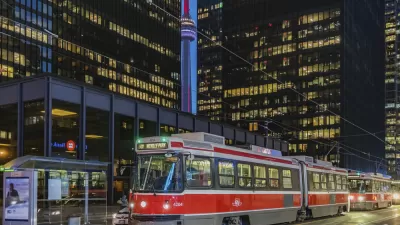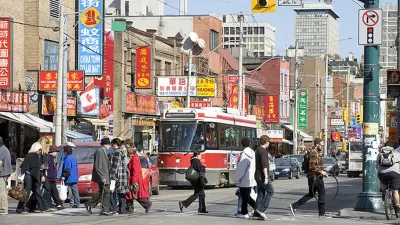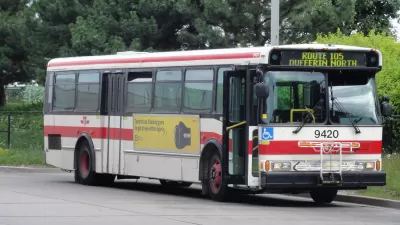Full or partial privatization of the Toronto Transit Commission (TTC) would likely result in diminished service and a less expansive transit network.
“In recent weeks, calls to privatize all or parts of Toronto’s transit service have grown louder and more frequent,” write Matt and Myer Siemiatycki.
The debate over privatization was sparked earlier this month by a pair of articles published in the Toronto Star which mulled privatization as a solution to the seemingly endless dis-satisfaction with transit service and lagging expansion.
“But arguments in favour of transit privatization amount to wishful thinking that defies both basic economic reasoning and the experience with transit privatization to date.”
In response to the suggestion that the TTC could auction off bus routes, the authors argue that some peripheral bus routes, while critical to the mobility of their users, are in fact money-losing. Profit-seeking private entities would have no choice but to eliminate or reduce the service on these routes, resulting in a net loss for Torontonians.
The claim by privatization advocates that the private sector will build subways in exchange for development rights is an argument that simply doesn’t add up. Many billions of dollars are required to build and operate subways whereas the value of development rights associated with value-uplifted land can be pegged at, perhaps, hundreds of millions.
“There is no free ride for the public purse under private involvement in transit. And any service ‘efficiencies’ would overwhelmingly come from cuts to non-profitable but needed services or from lower worker wages.”
FULL STORY: Privatization won’t solve Toronto’s transit problem

Maui's Vacation Rental Debate Turns Ugly
Verbal attacks, misinformation campaigns and fistfights plague a high-stakes debate to convert thousands of vacation rentals into long-term housing.

Planetizen Federal Action Tracker
A weekly monitor of how Trump’s orders and actions are impacting planners and planning in America.

Chicago’s Ghost Rails
Just beneath the surface of the modern city lie the remnants of its expansive early 20th-century streetcar system.

Bend, Oregon Zoning Reforms Prioritize Small-Scale Housing
The city altered its zoning code to allow multi-family housing and eliminated parking mandates citywide.

Amtrak Cutting Jobs, Funding to High-Speed Rail
The agency plans to cut 10 percent of its workforce and has confirmed it will not fund new high-speed rail projects.

LA Denies Basic Services to Unhoused Residents
The city has repeatedly failed to respond to requests for trash pickup at encampment sites, and eliminated a program that provided mobile showers and toilets.
Urban Design for Planners 1: Software Tools
This six-course series explores essential urban design concepts using open source software and equips planners with the tools they need to participate fully in the urban design process.
Planning for Universal Design
Learn the tools for implementing Universal Design in planning regulations.
planning NEXT
Appalachian Highlands Housing Partners
Mpact (founded as Rail~Volution)
City of Camden Redevelopment Agency
City of Astoria
City of Portland
City of Laramie





























